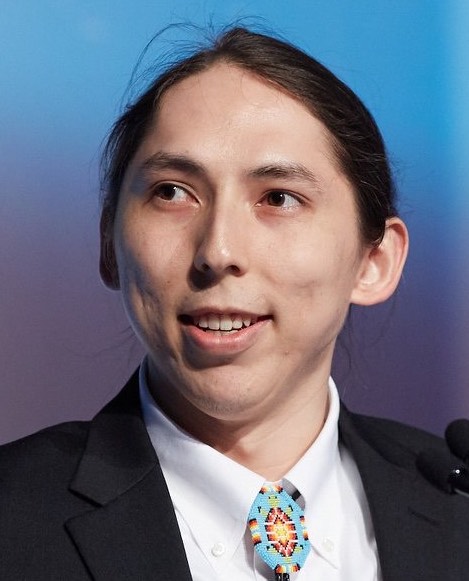
- Details
- By Kyle Edwards
The Supreme Court ruled on Thursday that a large swath of eastern Oklahoma remains the tribal land of the Muscogee (Creek) Nation, reaffirming that Congress had never disestablished the reservation’s 1866 boundaries. The decision was celebrated as a victory for tribal sovereignty and for upholding the federal government’s treaty obligations. Robert Anderson (Bois Forte Band of Ojibwe) is a professor and director of the Native American Law Center at the University of Washington School of Law. He also teaches at Harvard Law School. He spoke with Native News Online on Friday about the court’s historic ruling, what it means for Indian Country and what happens next.
Native News Online: In your view, what's the biggest significance of the Supreme Court's ruling?
Anderson: I think that Justice (Neil) Gorsuch joining the four so-called liberals on the court to support Indian rights in yet another case is really a huge victory, not just for the Creek Nation, but for Indian Country in general. He has demonstrated since he's been on the court that he understands federal Indian law in a way that recognizes what tribes and their attorneys have argued for many years––that the promises made by the federal government to tribes are to be kept, and that while Congress has the authority to change the terms of Indian rights, it has to do so explicitly. So it's a real big deal.
Does this ruling give land back to tribes, or will it affect land ownership in any way?
No, and that's a huge mistake that people have made. I saw that The New York Times, and I think the BBC, both had headlines that said ‘Supreme Court gives half of Oklahoma back to Indian tribes.’ This case only involved who has governmental power or jurisdiction, as we lawyers say, over the land within the exterior boundaries of the Creek reservation that was last confirmed in 1866. And since 1866, a lot of that land has passed into non-Indian ownership, whether it be private individuals and the city of Tulsa, or maybe other governments own land within there.
In this case, it does not affect who actually has legal title to property. What it does affect is who has criminal jurisdiction over cases involving Indians. Either as the victims of crime or as the defendant in a crime like Mr. McGirt.
So non-Indian landowners in eastern Oklahoma don’t need to be worried.
Right. They still own their property. They owned it yesterday morning, and then they own it today.
How will it affect prosecution powers by tribal courts?
Well, it really confirms what everybody thought before, which was that the tribes continue to have power to prosecute their own members and members of other Indian tribes who commit crimes within the Creek reservation. And so that is not affected by this decision, but it confirms it.
But they still will not be able to prosecute a non-Indian?
Correct. Non-Indians are not subject to tribal prosecution except for cases involving domestic abuse under the Violence Against Women Act that Congress passed in 2013, which said tribes have the authority to prosecute non-Indian domestic abusers who commit crimes against their spouses. Or domestic partners within Indian Country. So the Creek Nation would be able to prosecute those people.
Do you anticipate there being a reckoning of sorts over past convictions by state prosecutors in Oklahoma as a result of the ruling?
I don’t know for sure. But there was a lot of discussion about that in the oral arguments and in the briefs. And it seems to me that these defendants who might expect some relief from their state convictions would have to realize that all they get is to get prosecuted by the federal government for the same crime. And so if they're near the end of their sentence, being prosecuted by the federal government might not be that great a thing, because then they get a new sentence and they have to go back to jail––possibly for a more severe penalty.
Going back to the details of the ruling, which centered around the case of Jimcy McGirt (Seminole), who was found guilty of sex crimes by an Oklahoma court. What will happen to his case going forward? There might be some people watching this and thinking it might somehow overturn his conviction.
Well, it overturns his state court conviction, but the federal government has the authority to prosecute him because the crime he committed was a major crime. And that's subject to severe penalties under the Indian Major Crimes Act, which has been in place since 1885. So this guy's not going to be walking out of jail to commit more crimes tomorrow.
Do you see this ruling as a victory for Indian Country, or is it simply the court reaffirming what the Creek Nation has been saying this entire time, that this land belongs to us? How do you assess the historical significance of this ruling?
I think it's very significant historically. And I think it's a victory for the Creek Nation and for tribes across the country. For the Supreme Court, through Justice Gorsuch, to write a very forceful opinion that says even if we may not like to dissolve the results with Mr. McGirt having his conviction overturned, the fact is that Congress created an Indian reservation back in the mid-19th century through treaties and agreements with the Creek Nation. And that reservation exists. And tribal power over that reservation exists to the exclusion of state power until such time as Congress terminates or changes the reservation boundaries.
Justice Gorsuch said Congress has not done that in this case, and we're not going to make up new rules because we would prefer a different result. It's a principle that's part of federal Indian law that tribes and their attorneys have argued for many, many years. To me, it’s important that Justice Gorsuch has endorsed that same principle along with four members of the court.
Were you surprised by Justice Gorsuch's decision to side with the majority?
I was not. I listened very carefully to the oral argument and during the argument he continually pressed the state of Oklahoma about this notion that the reservation once established somehow disappeared through some sort of implication or magic. He kept asking them, "When did Congress do this?" And the state of course had no answer to that.
Are you worried at all by the fact that, even in the opinion, the court seemed to provide a roadmap for Congress to abolish treaties and reservations?
That might've been a concern in 1902, when Congress was all about extinguishing reservations and terminating tribal authorities. We're in a different day now. Congress has the authority to change reservation boundaries and to limit or extinguish tribal powers, but everything they've done since President Nixon was in office in 1970 has been to enhance and confirm tribal control over their lands and reservations, and encourage tribes to buy more land.
Beyond Oklahoma, what impact do you think this could have throughout Indian Country?
This dispute about reservation boundaries often comes up, along with disputes among tribes and states over who has authority within an Indian reservation. What this decision means is that, in all of those cases, wherever they occur throughout the United States, tribes have the upper hand in terms of the Supreme Court. The court has said that unless Congress has explicitly extinguished the reservation or changed the boundaries, they continue to exist. That means that the states and the counties and the non-Indians need to negotiate with each tribe as a governmental body with authority over that reservation, including their land.
Interview conducted, edited and condensed by Kyle Edwards.
More Stories Like This
Navajo Resources and Development Committee Issues Notice on Livestock Inspection RequirementsAmerican Prairie, Tribal Coalition Files Protest Over Rescinded Grazing Rights
Northern Cheyenne Push Back Against Trump Administration’s Effort to Alter Little Bighorn History
Florida Man Sentenced for Falsely Selling Imported Jewelry as Pueblo Indian–Made
Navajo Nation Declares State Of Emergency As Winter Storm Threatens Region
Help us defend tribal sovereignty.
At Native News Online, our mission is rooted in telling the stories that strengthen sovereignty and uplift Indigenous voices — not just at year’s end, but every single day.
Because of your generosity last year, we were able to keep our reporters on the ground in tribal communities, at national gatherings and in the halls of Congress — covering the issues that matter most to Indian Country: sovereignty, culture, education, health and economic opportunity.
That support sustained us through a tough year in 2025. Now, as we look to the year ahead, we need your help right now to ensure warrior journalism remains strong — reporting that defends tribal sovereignty, amplifies Native truth, and holds power accountable.
 The stakes couldn't be higher. Your support keeps Native voices heard, Native stories told and Native sovereignty defended.
The stakes couldn't be higher. Your support keeps Native voices heard, Native stories told and Native sovereignty defended.
Stand with Warrior Journalism today.
Levi Rickert (Potawatomi), Editor & Publisher

